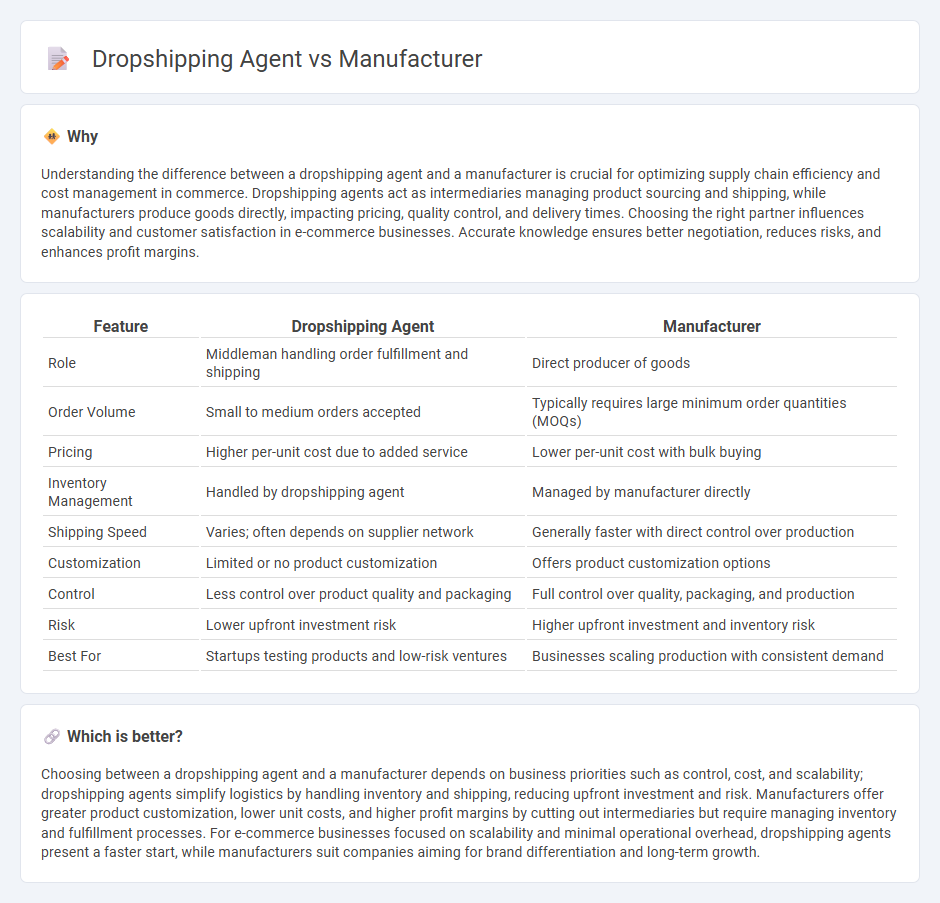
Dropshipping agents streamline order fulfillment by connecting retailers with manufacturers and handling storage, packaging, and shipping, which reduces inventory risks. Manufacturers produce goods directly, offering lower costs per unit but requiring larger capital investment and inventory management. Explore the differences between dropshipping agents and manufacturers to optimize your commerce strategy effectively.
Why it is important
Understanding the difference between a dropshipping agent and a manufacturer is crucial for optimizing supply chain efficiency and cost management in commerce. Dropshipping agents act as intermediaries managing product sourcing and shipping, while manufacturers produce goods directly, impacting pricing, quality control, and delivery times. Choosing the right partner influences scalability and customer satisfaction in e-commerce businesses. Accurate knowledge ensures better negotiation, reduces risks, and enhances profit margins.
Comparison Table
| Feature | Dropshipping Agent | Manufacturer |
|---|---|---|
| Role | Middleman handling order fulfillment and shipping | Direct producer of goods |
| Order Volume | Small to medium orders accepted | Typically requires large minimum order quantities (MOQs) |
| Pricing | Higher per-unit cost due to added service | Lower per-unit cost with bulk buying |
| Inventory Management | Handled by dropshipping agent | Managed by manufacturer directly |
| Shipping Speed | Varies; often depends on supplier network | Generally faster with direct control over production |
| Customization | Limited or no product customization | Offers product customization options |
| Control | Less control over product quality and packaging | Full control over quality, packaging, and production |
| Risk | Lower upfront investment risk | Higher upfront investment and inventory risk |
| Best For | Startups testing products and low-risk ventures | Businesses scaling production with consistent demand |
Which is better?
Choosing between a dropshipping agent and a manufacturer depends on business priorities such as control, cost, and scalability; dropshipping agents simplify logistics by handling inventory and shipping, reducing upfront investment and risk. Manufacturers offer greater product customization, lower unit costs, and higher profit margins by cutting out intermediaries but require managing inventory and fulfillment processes. For e-commerce businesses focused on scalability and minimal operational overhead, dropshipping agents present a faster start, while manufacturers suit companies aiming for brand differentiation and long-term growth.
Connection
A dropshipping agent acts as an intermediary between e-commerce retailers and manufacturers, facilitating order fulfillment without the need for inventory storage. Manufacturers produce goods based on demand and ship products directly to customers or warehouses via the dropshipping agent. This connection streamlines supply chain management, reduces overhead costs, and accelerates delivery times in online commerce.
Key Terms
Inventory Management
Manufacturers maintain direct control over inventory production, ensuring consistent quality and availability but often require larger storage capacity and upfront costs. Dropshipping agents manage inventory on behalf of retailers, offering flexibility with minimal storage investment but relying on third-party suppliers that may impact stock accuracy and delivery times. Explore how inventory management influences business efficiency by learning more about these operational strategies.
Order Fulfillment
Manufacturers handle order fulfillment by directly producing and shipping products, ensuring control over quality and inventory management. Dropshipping agents coordinate between retailers and suppliers, managing order processing and shipping without holding inventory, which reduces upfront costs and risks. Explore more about how these roles impact your supply chain efficiency and customer satisfaction.
Supply Chain Control
Manufacturers offer direct supply chain control by managing production schedules, quality standards, and inventory levels, ensuring consistent product output and timely fulfillment. Dropshipping agents serve as intermediaries who handle order processing and logistics, reducing inventory risk but limiting oversight on manufacturing and delivery processes. Explore the nuances of supply chain control with manufacturers and dropshipping agents to enhance your business efficiency.
Source and External Links
Manufacturer Definition - Arena Solutions - A manufacturer is an organization that produces and assembles finished goods from raw materials or parts, selling them to consumers or other businesses for further production or resale.
How To Find a Manufacturer or Supplier for a Product (2025) - Shopify - A manufacturer is a specific type of supplier that produces unique products or parts, distinct from wholesalers or dropshipping suppliers, with choices between domestic and overseas manufacturing impacting cost, lead times, and quality.
5 Things You Should Know: SBA's Definition of Manufacturer - According to the SBA, a manufacturer is a company that performs primary activities transforming or assembling materials into a new end item using its own facilities, with only one recognized manufacturer per end item for size standards.
 dowidth.com
dowidth.com